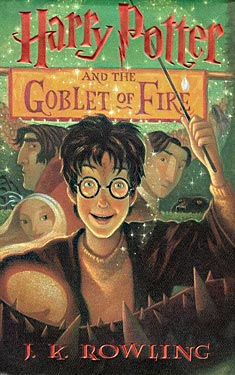JK Rowling
Completed 6/6/2015, Reviewed 6/22/2015
5 stars
I finished my quest to read all the Hugo winners last
year. However, there were six books I
had read before my quest which did not have reviews, since I read them before I
was writing reviews. “Goblet of Fire” is
the last of these. It was the reason for
my reread of the whole Harry Potter series.
When I discovered that Goblet won the Hugo, I couldn’t remember enough
of it to understand why it won. Granted,
the HP phenomenon was already at a frenzy, and “Prisoner of Azkaban” had been
nominated the year before. But I think
what pushed this book into the winner’s column was that it completed the
transition to a darker tone begun in “Prisoner”, while revealing an emotional
depth that reverberated with more readers than ever before.
 In this book, Hogwarts is hosting the Triwizard Competition
with two other academies. A champion
from each school is chosen from the contenders by a flaming cup. Entrants put their names in the cup and after
the nomination period, the cup spits out its champion picks. On the appointed day, the champions’ names
are revealed, but a fourth name comes out, Harry’s. No one know who entered him. He certainly didn’t. The cup shouldn’t have accepted him because
he’s underage. But it certainly seems
that whoever did, seemed to want to put Harry’s life in jeopardy, or at least,
make public opinion sway against him as a self-absorbed attention-getter. The plot of the book follows the tournament,
the unraveling of who entered him in the competition, and of course, the
growing threat of the Dark Lord Voldemort.
In this book, Hogwarts is hosting the Triwizard Competition
with two other academies. A champion
from each school is chosen from the contenders by a flaming cup. Entrants put their names in the cup and after
the nomination period, the cup spits out its champion picks. On the appointed day, the champions’ names
are revealed, but a fourth name comes out, Harry’s. No one know who entered him. He certainly didn’t. The cup shouldn’t have accepted him because
he’s underage. But it certainly seems
that whoever did, seemed to want to put Harry’s life in jeopardy, or at least,
make public opinion sway against him as a self-absorbed attention-getter. The plot of the book follows the tournament,
the unraveling of who entered him in the competition, and of course, the
growing threat of the Dark Lord Voldemort.
Besides the over-arching theme of good versus evil with
Harry and Voldemort, the point of this book is that Harry and the gang are
little more grown up. They act less like
children, less like the archetypes of the brain, the goof, and the hero. Their characters are becoming more
complex. Perhaps the most visible change
is in Hermione. Her black and white
world of right and wrong is becoming greyer.
She gets to lose control, grow angry, and have more empathy. At the annual formal ball, which the fourth
year students are permitted to attend, she has a boyfriend, the champion from one
of the schools. Harry and Ron also
attend with dates, but exemplifying how girls may be more emotionally mature
than boys, the evening for the two is ripe with awkwardness and ignorance.
Even Hagrid gets a love interest, a giantess named Maxime
from the French wizard’s academy. There’s
an awesome scene where Dumbledore dances with Maxime that is awkward and
hilarious. The ball in general signifies
the place of the book in the lives of its characters, reminding me of my own
experience of freshman year high school.
The awkwardness of fourteen year olds at school dances and the time where
you first see teachers as real people. It’s
embarrassing, funny, pathetic, and human.
“Goblet of Fire” is the first of the extremely long
books. What keeps it from seeming too
long is the pace of the action. The
competition has three stages, and the tension in the book builds as each stage
draws near. The final stage, keeping
with the basic format of all the books so far, is the setup for the next and most
terrifying confrontation with Voldemort yet, and the first that deals with the
death of a character. I remember the
film’s progression of the competition feeling empty while the climax lacked the
emotional punch. The book’s emphasis on
the relationships, particularly the interaction of the competitors, makes it fuller
and more emotionally engaging.
While “Prisoner” is still my favorite book so far, “Goblet
of Fire” is complex, exciting, and devastating.
Five out of five stars. I
understand why it won the Hugo. It’s a
transitional book reflecting the teen awkwardness of its readers. Rowling’s genius is most evident here. It is not just the complexity of the overall
plot and the details of the subplots, but the ability to match the emotional
development of the characters with the target age of its readers.
No comments:
Post a Comment